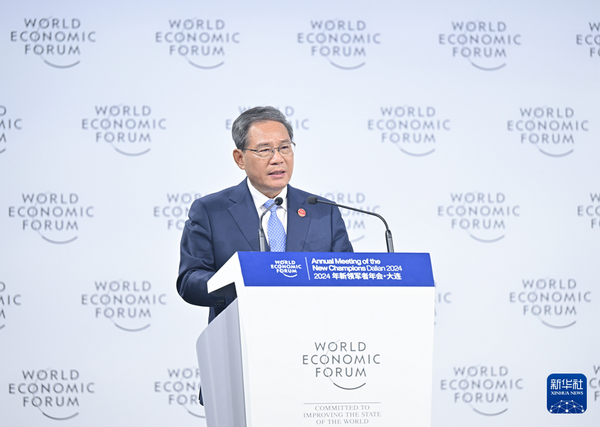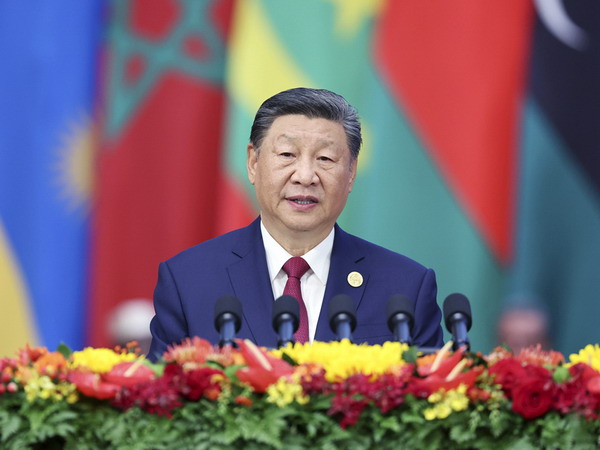Opening Plenary Of the Annual Meeting of the New Champions 2024
It is a great pleasure to join friends, old and new, here in the beautiful city of Dalian for the 15th Annual Meeting of the New Champions. Let me begin by extending, on behalf of the Chinese government, warm congratulations on the opening of the annual meeting and cordial welcome to all participants and journalists.
It has been five years since the Summer Davos was last held in Dalian. In the past five years, global transformation not seen in a century unfolded at a faster pace and world economic
development reached a critical juncture. As many people wonder where the future of the world lies, this annual meeting, focusing on “Next Frontiers for Growth,” is particularly relevant. I believe you all have your own thoughts and insights about the significance and value of exploring next frontiers for growth. Here, I would like to share with you three observations.
First, we need to confront the growth predicament of the world economy. The road to recovery has been treacherous since the onset of COVID-19. According to forecasts of the International Monetary Fund and other institutions, global growth may remain moderate or even slow in the coming years, and generally below the pre-pandemic level. Anemic global growth is not only caused by temporary factors such as impact of the pandemic, high inflation and rising debt. It is also ascribed to some deep-seated problems and intrinsic issues. From a cyclical perspective, the three industrial revolutions since the 1760s, which were respectively marked by the utilization of steam engines, electricity and information technologies, all transformed the way of production and life in human society. Each was followed by a surge in global growth. However, when the impetus unleashed by existing technological models diminished, global growth would slide into a period of stagnation. The impact of such fundamental transformation is manifold. At the macro level, we would see a slowdown of economic growth, and find it more difficult to make the pie of global economy bigger. At the meso level, we would see declining return on investment and diminishing economies of scale, with more business sectors turning from blue to red oceans. At the micro level, we would see intensifying competition among market players and spiraling “involution.” The neck-to-neck contest for available resources is, to some extent, triggering problems including backlash against globalization and escalation of geopolitical conflicts.
Confronted with the growth predicament of the world economy, maximizing one’s own benefits at the expense of others’ interests, or resorting to regressive actions of decoupling, disrupting supply chains and building small yards with high fences would only push up operational costs, sever the economic links between regions and aggravate tensions and disputes. This would drag the world into a destructive spiral where the fierce competition for a larger slice ends up in a diminishing pie. As we Chinese often say, “Range far your eye over long vistas.” In the current context, the right choice is to approach development issues with a longer view and broader mind, and join hands with others to make the pie bigger while pursuing one’s legitimate interests. This is how we could sustain the growth of the world economy, and open new horizon for our own development.
Second, we need to seize the new opportunities brought by the sci-tech revolution and industrial transformation. To overcome the growth predicament, we need to cultivate new engines for growth. We are delighted to see that as the new round of sci-tech revolution and industrial transformation deepens, global innovation activities in science and technology have become more intensive and dynamic than ever before. With the sparks ignited across domains, next frontiers for growth are starting to take shape. From a technology perspective, this round of sci-tech revolution is mainly powered by progress in intelligent, green and health technologies. The rapid advance of cutting-edge information, energy and biological technologies has provided new pathways for tackling climate change, energy crisis and other major challenges facing humanity. It has also notably enhanced the quality and efficiency of the supply system, and catalyzed and generated massive new demand. From an industry perspective, breakthroughs and integration of frontier technologies have redefined traditional production function, triggered a quantum leap in productivity, and opened up new domains and avenues of business, including artificial intelligence (AI), green energy and biomedicine. A host of sectors are expected to evolve into multi-trillion-dollar pillar industries. From a business model perspective, as the sci-tech revolution progresses, the organization of economic activities and industries is undergoing rapid transformation, which is characterized by the features of platform-based operation, networked structure and ubiquitous presence. New forms and models of business such as online services, C2M customization, and smart manufacturing are quickly emerging, making our life more convenient, and giving everyone a fair and accessible chance to participate. In a word, a number of frontier technologies and industries with the potential of explosive growth are metamorphosing and ready to burst onto the stage. This brings light and hope for catapulting the world economy into a new upward cycle.
To embrace the global trend of sci-tech advances and industrial development, all countries are making forward planning and deployment. China has also taken exploratory steps in this regard. In recent years, we have continued to promote high-quality development, accelerate the cultivation of new quality productive forces, and foster new drivers of growth. These efforts have provided strong dynamism for China’s economic development, and created greater cooperation space for companies around the world. The rapid rise of China’s new industries is in line with the global trend of sci-tech revolution and green development. Seizing the favorable opportunities from the sci-tech revolution and industrial transformation worldwide, China has been working hard to advance sci-tech innovation. We encourage companies to be first movers and make continuous investments in cutting-edge fields. Now, after years of cultivation, a number of enterprises and industries in China have gained an edge internationally. In particular, China has been vigorously developing green industries in recent years, such as new energy, to address climate change with concrete actions and meet the twin goals of carbon peak and carbon neutrality. As a result, China’s installed capacity of hydropower, wind power, solar power and nuclear power under construction has all been topping the world for many years running. And renewable energy now accounts for over 50 percent of China’s total installed capacity. Electric vehicles, lithium batteries and photovoltaic products made by Chinese companies have not only met domestic demand, but also enriched supply in the international market, eased the pressure of inflation worldwide, and contributed to the global climate response. The rapid rise of China’s new industries is rooted in its unique comparative advantages. China has a super-sized market of more than 1.4 billion people, a complete industrial supporting system, abundant labor force and talent pool, and diverse scenarios for application. Plus, Chinese consumers are fairly receptive to new technologies. All these make China a broad stage for enterprises to pursue innovation and upgrade their products. The economies of scale can help to reduce innovation costs for enterprises and accommodate the growth of different technology roadmaps and business models. That is also how China’s emerging industries get their competitiveness. The rapid rise of China’s new industries is a testament to the principal role of enterprises in innovation. Enterprises stand at the forefront of the market. They are most sensitive to the changes of demands, and have the strongest desire for innovation. From the Chinese government’s perspective, we have been doing our best to foster a market-oriented, world-class business environment within a sound legal framework. To that end, we have been abolishing regulations that limit market access and fair competition, facilitating the flow of factors of innovation to enterprises and promoting fine entrepreneurial spirit, so that enterprises can fully unleash the dynamism of innovation. China’s large market is open. Foreign companies compete, communicate and cooperate with domestic ones on a level playing field, and they have become a major force enabling the birth and growth of emerging industries. The rapid growth of new industries and new drivers has buttressed the sound and sustained development of the Chinese economy. Since the start of this year, the Chinese economy has sustained the momentum of recovery. It got off to a good start in the first quarter with a 5.3 percent year-on-year growth, and continued steady growth in the second quarter. We have the confidence and capability to achieve the growth target of around 5 percent for this year.
Third, we need to open up a vast blue ocean for future economic development. Facing major opportunities brought by the latest round of sci-tech revolution and industrial transformation, we will, as always, keep to the direction of building an open world economy, harness the momentum, make bold explorations, and work together to create new development space. In this connection, I wish to propose the following:
—First, deepening sci-tech exchanges and cooperation. Science and technology are key variables in future development. Major sci-tech progress usually comes from unrelenting research, accumulation and extensive cooperation. The exploration of new frontiers should not be seen as a zero-sum game. It is a process where all players compete for excellence and make progress together. Resorting to the “small yard, high fence” approach cannot hold back the development of others; it only ends up constraining oneself. The wise thing to do is to create an open, fair and nondiscriminatory environment for sci-tech innovation on the basis of protecting intellectual property, so as to enable the free flow of ideas for innovation and creation.
—Second, enhancing the foundation for green development. There is only one Earth for humanity. Growth in the future has to be premised on harmony between man and nature. We need to stand by the goals and principles of the United Nations Framework Convention on Climate Change and its Paris Agreement, follow the principle of common but differentiated responsibilities, and deliver on our respective emission reduction responsibilities. We cannot slow down our pace in green transition in exchange for short-term growth, or practice protectionism in the name of green development or environmental protection. Green transition itself provides huge potential for development. We need to jointly advance the development of green and low-carbon industries and foster more growth drivers for the green economy.
—Third, safeguarding an open market environment. The history of global economic development shows that openness brings progress while isolation leaves one behind. Only through open interactions, exchanges and mutual learning can we keep pushing the boundaries of development and discover and open up new frontiers. In many ways, the depth of international cooperation determines the height of human development. So it is essential that we embrace each other with open arms and work closely with each other, reject bloc confrontation and decoupling, keep industrial and supply chains stable and smooth, and advance trade and investment liberalization and facilitation, so as to promote the sound development of globalization and form a strong synergy for global economic growth.
—Fourth, promoting inclusive and mutually beneficial development. New technologies such as AI and big data, while contributing to economic growth, may also cause problems such as structural unemployment, economic inequality and technology and AI divide. It is important to coordinate the development and governance of new technologies, make timely improvements to laws and governance frameworks to address conflicting rules and social risks brought by frontier technologies and industrial development, and strive to achieve more inclusive development that benefits all. It is also important to provide education and training to vulnerable groups and upskill the workforce, so that more countries and people can benefit from innovation.
Development has no limits. Exploration knows no boundary. China stands ready to join hands with all countries to sail the giant ship of the world economy into a vast blue ocean and create an even brighter future for humanity.


 Government1 week ago
Government1 week ago
 Sports3 weeks ago
Sports3 weeks ago
 Business4 weeks ago
Business4 weeks ago
 Religion3 weeks ago
Religion3 weeks ago
 Business3 weeks ago
Business3 weeks ago
 Sports2 weeks ago
Sports2 weeks ago
 Government2 weeks ago
Government2 weeks ago
 International2 weeks ago
International2 weeks ago






















